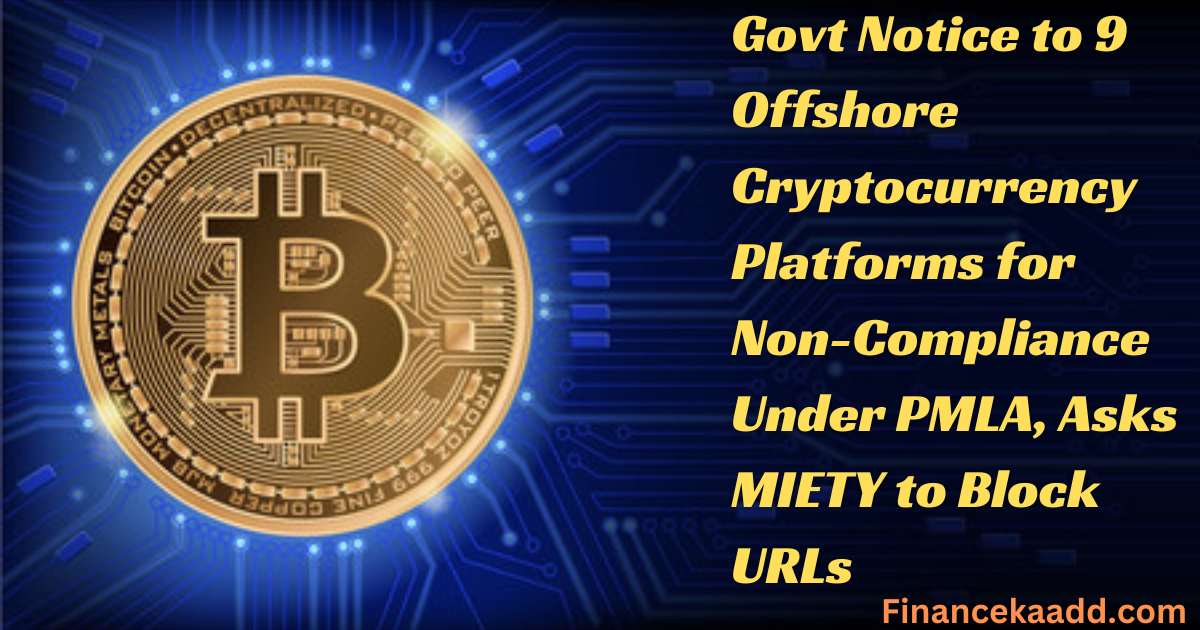In a groundbreaking move, the government has served notices to nine offshore cryptocurrency platforms due to their non-compliance with the Prevention of Money Laundering Act (PMLA). This development marks a crucial turning point in how cryptocurrency regulations are enforced in the country.

Unraveling Offshore Cryptocurrency Platforms
Understanding the intricacies of offshore cryptocurrency platforms is essential to grasp the significance of the recent government notice. These platforms, operating beyond national borders, present unique challenges to regulators, intensifying concerns and scrutiny.
The PMLA Framework: Ensuring Financial Integrity
The Prevention of Money Laundering Act (PMLA) stands as a linchpin in regulating financial activities, including cryptocurrencies. Compliance with the PMLA is not just a legal obligation; it is vital for maintaining the integrity and security of the financial system.
Delving into Specific Non-Compliance Issues
The government’s notice highlights specific non-compliance issues against the nine offshore cryptocurrency platforms. Understanding these issues is paramount to comprehending the severity of the situation and its potential impact on the broader cryptocurrency community.
MIETY’s Role: Blocking URLs for Accountability
The Ministry of Electronics and Information Technology (MIETY) has been entrusted with the task of taking action against the non-compliant platforms. This involves the blocking of URLs associated with these platforms, a measure with far-reaching consequences for their operations.
Platform Responses: Insights into Industry Stance
In response to the notice, the nine offshore cryptocurrency platforms have issued statements, presenting their perspectives on the allegations. Analyzing these responses provides valuable insights into the industry’s stance on regulatory compliance.
Regulatory Challenges for Offshore Platforms
Regulating offshore cryptocurrency platforms poses a complex task due to their global nature. Coordination among different regulatory authorities is crucial to effectively address the challenges presented by these platforms.
WATCH THIS VIDEO👇🏿
The notice carries significant implications for the future of offshore cryptocurrency platforms. Understanding the potential consequences for non-compliant platforms is essential for industry players and enthusiasts alike.
Ensuring Compliance for Cryptocurrency Users
As regulatory measures tighten, cryptocurrency users must exercise vigilance in choosing compliant platforms. This section provides practical tips for users to identify platforms adhering to regulatory standards.
Learning from Global Models
Examining how other countries regulate offshore cryptocurrency platforms can offer valuable insights for India. Adopting international best practices is essential for the effective governance of the cryptocurrency industry.
The Role of Technology in Compliance
Innovations in blockchain tracking play a crucial role in ensuring regulatory compliance. This section explores how technological advancements contribute to transparency in cryptocurrency transactions.
Economic Impact Beyond Cryptocurrencies
The economic repercussions of the notice extend beyond the cryptocurrency industry. Balancing innovation with regulatory responsibility is vital to strike a sustainable equilibrium.
Legal Consequences for Non-Compliance
Non-compliance with regulatory measures may lead to legal actions against offshore cryptocurrency platforms. Understanding the potential legal ramifications is crucial for stakeholders in the industry.
Public Opinion and Societal Impact
Social media reactions to the notice shape public perception. Examining how the public perceives cryptocurrency regulation provides insights into the broader societal impact of these developments.
Shaping the Regulatory Landscape
The government’s notice to nine offshore cryptocurrency platforms marks a significant step in shaping the regulatory landscape. Balancing innovation, compliance, and public interest is key to ensuring the sustainable growth of the cryptocurrency industry in India.
DOWNLOAD BINOMO👉CLICK HERE
Industry Responses and Diverse Perspectives
Responses from offshore cryptocurrency platforms vary, reflecting diverse opinions within the industry. Some platforms acknowledge the need for increased regulatory scrutiny, emphasizing the importance of self-regulation and adherence to established laws. On the other hand, a few entities argue that the regulatory framework lacks clarity, advocating for more dialogue between the government and the cryptocurrency community.
Global Regulatory Insights
To understand the unique challenges faced by the Indian government, exploring how other countries regulate cryptocurrency platforms is crucial. Drawing comparisons with international models sheds light on potential strategies and pitfalls, aiding in the formulation of a robust regulatory framework.
Financial Inclusion Amidst Tightened Regulations
The notice raises questions about the balance between regulatory oversight and the promotion of financial inclusion. As the government tightens regulations, ensuring these measures do not hinder access to cryptocurrency for individuals with limited traditional banking services becomes a focal point.
Blockchain Technology’s Regulatory Role
Examining the role of blockchain technology in ensuring compliance unveils a promising aspect of this notice. The article delves into innovations in blockchain tracking that can be instrumental in addressing regulatory concerns while preserving the decentralized nature of cryptocurrencies.
Community Engagement and Education
With the evolving regulatory landscape, community engagement and education are paramount. This section explores the role of industry associations, educational initiatives, and collaborative efforts in fostering a better understanding of regulatory compliance within the cryptocurrency community.
Implications for Startups and Innovators
Startups and innovators in the cryptocurrency space face unique challenges in light of the notice. This segment discusses potential implications for emerging players, highlighting the importance of adaptability and proactively addressing regulatory concerns.
The cryptocurrency industry often operates in grey areas, navigating the fine line between innovation and regulatory compliance. This section delves into the challenges of defining clear regulations while fostering an environment that encourages technological advancements.
OPEN YOUR ACCOUNT PAYTM MONEY👉CLICK HERE
Investor Confidence in a Regulated Market
The notice’s impact on investor confidence is a critical aspect to consider. Analyzing how investors perceive regulatory developments provides insights into potential shifts in investment patterns within the cryptocurrency market.
Advocacy Groups’ Role in Shaping Policy
Advocacy groups play a significant role in representing the interests of the cryptocurrency community. Exploring their responses to the notice sheds light on ongoing efforts to influence policy decisions and promote a balanced regulatory environment.
A Watershed Moment
In conclusion, the government’s notice to nine offshore cryptocurrency platforms is a watershed moment in India’s regulatory approach to digital assets. Striking the right balance between innovation and compliance is essential for fostering a sustainable and inclusive cryptocurrency ecosystem. As the industry adapts to evolving regulations, collaborative efforts between the government, industry players, and the community are key to shaping a robust future for cryptocurrencies in India.
Consumer Protection in a Regulated Environment
As regulations tighten, ensuring consumer protection becomes a top priority. The article details the measures that the government may take to protect consumers from potential risks, fraud, and market manipulation within the cryptocurrency sector.
Industry Collaboration and Self-Regulation
The role of industry collaboration and self-regulation cannot be understated. This segment analyzes how collaborative efforts within the cryptocurrency industry and proactive self-regulation can complement government measures, contributing to a more resilient and responsible ecosystem.
Evolving Technologies in Compliance
Technology continues to evolve, and this section delves into how emerging technologies beyond blockchain might play a role in enhancing regulatory compliance. Artificial intelligence, machine learning, and decentralized finance (DeFi) are among the innovations that could shape the future of regulatory frameworks.
Societal Perception and Acceptance
The notice’s impact on societal perception and acceptance of cryptocurrencies is a critical aspect to consider. Exploring how the public perceives these regulatory developments sheds light on the broader social implications and cultural attitudes toward digital assets.
OPEN YOUR ACCCOUNT M,STOCK👉CLICK HERE
Shaping the Future
The government’s notice to offshore cryptocurrency platforms signals a pivotal moment in the ongoing dialogue between regulators and the industry. As the cryptocurrency landscape matures, collaboration, adaptability, and a nuanced approach to regulation are essential for building a sustainable and inclusive ecosystem.
Decoding Government Strategies for Cryptocurrency Innovation
In the dynamic realm of cryptocurrency, understanding the government’s stance on innovation is paramount for both industry players and enthusiasts. Let’s dissect the intricacies of the official notice, unraveling the government’s commitment to fostering innovation while mitigating potential risks linked to unregulated digital assets.
In the ever-evolving landscape of cryptocurrency regulations, safeguarding consumer interests takes center stage. This section scrutinizes the concrete measures the government may employ to shield consumers from risks, fraud, and market manipulation within the cryptocurrency sector.
Industry Collaboration and Proactive Self-Regulation
The synergy between industry collaboration and self-regulation proves to be a linchpin in the cryptocurrency narrative. This segment delves into how concerted efforts within the industry and proactive self-regulation can complement government initiatives, paving the way for a more robust and responsible ecosystem.
Unveiling Technological Frontiers in Regulatory Compliance
As technology continues its relentless evolution, this section explores the role of emerging technologies beyond blockchain in enhancing regulatory compliance. Artificial intelligence, machine learning, and decentralized finance (DeFi) emerge as pivotal innovations that could shape the future landscape of regulatory frameworks.
Shaping Public Perception: Societal Attitudes towards Cryptocurrency
The ripple effect of the government’s notice on offshore cryptocurrency platforms extends to societal perceptions and acceptance. Examining how the public interprets these regulatory developments provides insights into the broader social implications and cultural attitudes toward digital assets.
Closing the Chapter: A Pivotal Moment in Regulatory Evolution
In conclusion, the government’s notice directed at offshore cryptocurrency platforms signifies a pivotal moment in the ongoing discourse between regulators and the industry. As the cryptocurrency landscape matures, embracing collaboration, adaptability, and a nuanced regulatory approach become
FAQs: Understanding the Government’s Notice to Offshore Cryptocurrency Platforms
Q. What prompted the government to issue notices to offshore cryptocurrency platforms?
Ans. The government’s action stems from concerns about non-compliance with the Prevention of Money Laundering Act (PMLA), aiming to ensure financial integrity.
Q. How does MIETY play a role in blocking URLs of non-compliant platforms?
Ans. MIETY, the Ministry of Electronics and Information Technology, is tasked with implementing the government’s directives, including blocking URLs to enforce regulatory compliance.
Q. What are the potential legal challenges faced by the offshore cryptocurrency platforms?
Ans. Legal challenges may arise from allegations of non-compliance, and the platforms may navigate complex legal landscapes in response.
Q. How are investors and stakeholders reacting to the government’s notice?
Ans. Reactions from investors and stakeholders provide insights into market sentiments and the potential impact on the cryptocurrency industry.
Q. What can the cryptocurrency industry do to advocate for self-regulation?
Ans. The article explores arguments for self-regulation and balancing industry autonomy with responsible governance.
Q. How does the government plan to balance innovation with regulatory safeguards in the cryptocurrency space?
Ans. The article explores the government’s approach to fostering innovation while addressing potential risks associated with unregulated digital assets.
Q. What measures might the government take to protect consumers in the cryptocurrency sector?
Ans. Consumer protection measures are discussed, emphasizing the government’s role in safeguarding consumers from potential risks and fraud.
Q. How can industry collaboration and self-regulation complement government measures in the cryptocurrency sector?
Ans. This section analyzes the significance of collaborative efforts within the industry and proactive self-regulation in creating a resilient and responsible ecosystem.
Q. What role might emerging technologies beyond blockchain play in enhancing regulatory compliance?
Ans. The article delves into how technologies like artificial intelligence, machine learning, and decentralized finance could shape the future of regulatory frameworks.
Q. How does the notice impact societal perception and acceptance of cryptocurrencies in India?
Ans. Examining public perception provides insights into the broader social implications and cultural attitudes toward digital assets.


